Building families through the ages
Part of a yearlong series about builders and building the Jewish future.

The Torah portion Chayyei Sarah may be called “the life of Sarah,” but it’s really about her family getting on with their lives after her death. It begins with Sarah’s burial, ends with Abraham’s death, and sandwiched in the middle is the long saga of seeking and finding a suitable wife for Isaac.
The story is told with much repetition and in great detail, in the longest chapter in Genesis. But why? Usually the Torah chooses words carefully, sparingly. Not here. We follow every step of the way as Eliezer goes off to find a wife for his master’s son. He pauses to say a prayer and sure enough his prayer is answered, a young woman appears, negotiations ensue, and Rebecca returns with Eliezer to be Isaac’s wife.
But before all of that happens, the Torah says “…the Lord blessed Abraham in all things.” (Genesis 24:1). Clearly not all things, since his son was still unmarried and without a child to fulfill God’s promise of a great nation coming from him and Sarah. Abraham had to take matters into his own hands, using Eliezer as his emissary, to ensure that the covenant God promised to them would be fulfilled.
And he also ensured two important things on behalf of Isaac – that he would be comforted on the loss of his mother, and experience love. On this, the Woman’s Torah Commentary says (p. 124) “This final verse [of the story], which focuses on Isaac’s emotional connections to his mother and to his new wife, reasserts the central role that women play in realizing God’s covenantal promise.”
Indeed. We know that Jewish mothers are the backbone of the Jewish family, the building blocks of Jewish community. The story of Isaac and Rebecca is the foundational story of the Jewish family, the beginning of our emphasis on the importance of establishing a family and a home.
Fathers are important too, of course. Abraham took an active role in the matter, not waiting for God to ensure that his and Sarah’s lineage would continue. But once he had taken care of providing a wife for his son Abraham went his own way, seemingly content that the results would speak for themselves. It was up to Isaac and Rebecca.
Much of Jewish practice is home-based. Women have carried the burden of creating Jewish homes with enthusiasm, knowing that they are building something more solid and more meaningful than any edifice or physical structure. They are building community, and a future.
 So what does it mean to create a Jewish home? Once upon a time, the answer was uniform – everyone did basically the same things, living within the confines of their Jewish communities and communal structures. For most of us, that is no longer true.
So what does it mean to create a Jewish home? Once upon a time, the answer was uniform – everyone did basically the same things, living within the confines of their Jewish communities and communal structures. For most of us, that is no longer true.
Today’s Jewish homes vary widely from one another. Some observe the laws of kashrut, many don’t. Some families belong to a synagogue and send their kids to Hebrew school, but many don’t. Some light candles on Friday night, some go to the high school football game. Some maintain their Jewish identity through books, art, culture, foods. Some simply feel Jewish; it is not uncommon for a modern American Jew to say, “I’m just Jewish.”
It sometimes feels that the old communal structures have crumbled, leaving many Jews isolated. But today we have new tools that help us build bridges to each other and our Jewish tradition, using technologies that the ancient rabbis could never have imagined.
We can study with teachers from all over the world. We can build relationships with people whom we’ve never met in person, transcending physical and geographic boundaries. We can reach out to family and friends who live on the other side of the globe, and speak to each other as if we are face-to-face, using technologies that are accessible to everyone.
 And thanks to these technologies, we can access Judaism in ways that once were unheard of, without filters, without embarrassment or frustration. If you or someone you know is floundering, unsure of where to turn and how to find meaningful Jewish content, this website is a powerful resource designed for just those purposes, but it is not the only one. We are incredibly fortunate to live in a time when so much is right at our fingertips – Jewish books, music, even live-streamed Friday night synagogue services.
And thanks to these technologies, we can access Judaism in ways that once were unheard of, without filters, without embarrassment or frustration. If you or someone you know is floundering, unsure of where to turn and how to find meaningful Jewish content, this website is a powerful resource designed for just those purposes, but it is not the only one. We are incredibly fortunate to live in a time when so much is right at our fingertips – Jewish books, music, even live-streamed Friday night synagogue services.
Judaism is in the air, on the net, ready for you to take advantage of all it has to offer, ready to help each of us establish meaningful Jewish homes for our families and ourselves.


by Rabbi Jennifer Singer; sketchnote by Steve Silbert

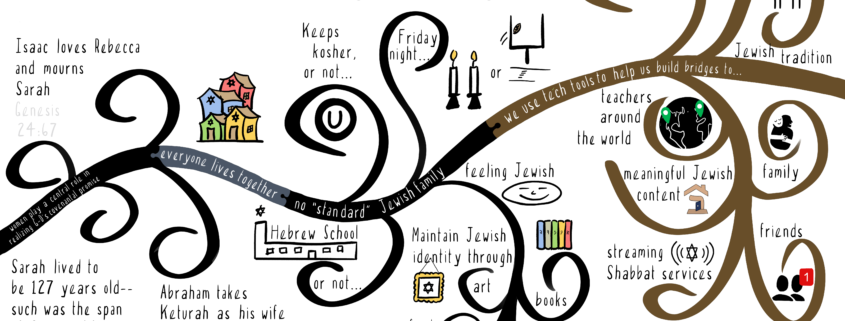

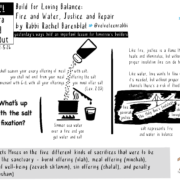

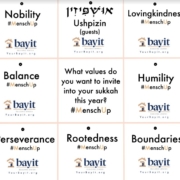
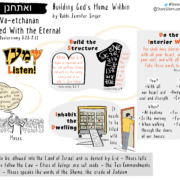
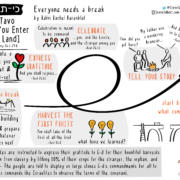


Trackbacks & Pingbacks
[…] Building Families Through The Ages […]
Comments are closed.